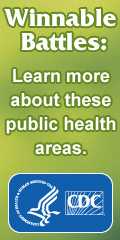July 2016
Did You Know? is a weekly feature from the Office for State, Tribal, Local and Territorial Support to inform your prevention activities. We invite you to read, share, and take action!
View the Current Did You Know?
July 29, 2016
- Smoking causes one of every three deaths from cardiovascular disease.
- The latest Million Hearts® Action Steps Guide [PDF-318KB] provides clinicians with tested strategies for identifying and treating patients who use tobacco.
- Clinicians can try evidence-based protocols for treating tobacco users or customize their own Million Hearts® Tobacco Cessation Protocol [PDF-432KB] template.
July 22, 2016
- Men and women 50–75 years old should be screened for colorectal (colon) cancer, but at least one third of people in that age group haven’t been tested as recommended.
- CDC’s Screen for Life campaign features celebrities—Morgan Freeman, Meryl Streep, Katie Couric, Diane Keaton, Jimmy Smits, and Terrence Howard—explaining the benefits of colorectal cancer screening.
- Several kinds of tests can find colorectal cancer, so people 50 or older should talk to a doctor about which test is right for them.
July 15, 2016
- Cigarette smoking is the number one risk factor for lung cancer, and African American men have the highest rates of lung cancer in the United States.
- Menthol cigarette smoking is highest among African Americans—a likely effect of targeted marketing by the tobacco industry.
- To learn more about tobacco-related behaviors and disparities among African Americans, read the new supplement in Nicotine & Tobacco Research.
July 8, 2016
- About 90 people die each day from motor vehicle crashes on US roads, according to the latest CDC Vital Signs.
- The US crash death rate is more than twice the average of 19 other high-income countries.
- States can implement proven policies and strategies to prevent thousands of crash-related injuries and deaths.
July 1, 2016
- About 60 million people around the world were displaced from their homes in 2015 due to conflict or disaster.
- CDC works with its partners to improve, promote, and protect the health of refugees in humanitarian crises and those undergoing resettlement to the United States.
- State and local public health professionals can use CDC resources to learn more about immigrant, refugee, and migrant health, including laws and regulations around medical examinations and vaccinations.
Did You Know? information and web links are current as of their publication date. They may become outdated over time.
- Page last reviewed: July 29, 2016
- Page last updated: October 13, 2016
- Content source:



 ShareCompartir
ShareCompartir



